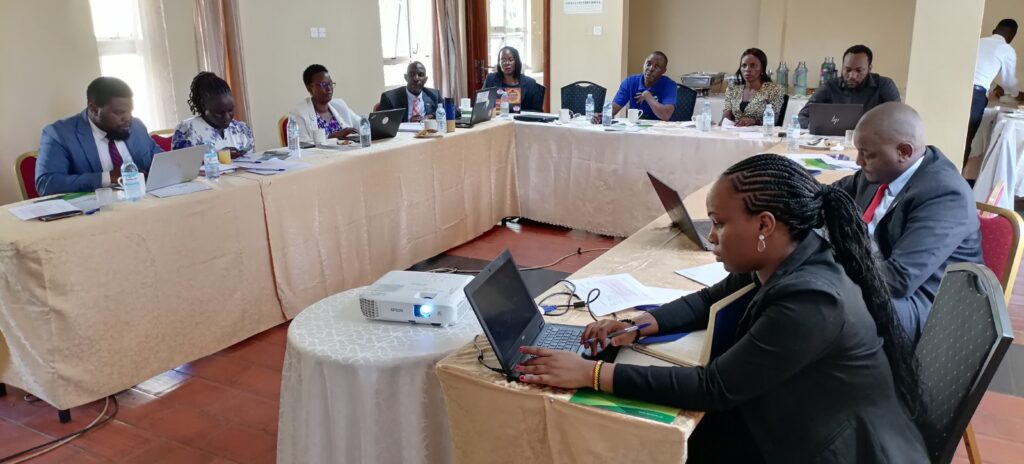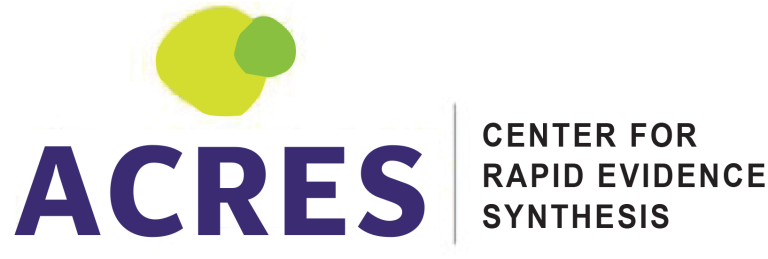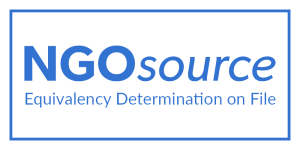ACRES and ERI’s Evidence Gap Map to inform natural resources policy

ACRES and ERI’s Evidence Gap Map to inform natural resources policy By Bakari Ssettumba The Center for Rapid Evidence Synthesis (ACRES) and Earth & Rights Initiatives Uganda (ERI) have embarked on an initiative to create an Evidence Gap Map on natural resources degradation in Uganda. This innovative tool aims to inform evidence-driven litigation and […]
The Center for Rapid Evidence Synthesis (ACRES) annual report, 2022
The year 2021/2022 saw ACRES scale up responses to more decision-makers questions at national and subnational levels in response to the impact of the COVID 19 pandemic. At the national level, ACRES supported processes at the Ministry of Health, Ministry of Gender, Labour and Social Development (MGLSD); Education service commission, Ministry of Education and Sports; […]
Ministry of health governance and management structures implementation guidelines
The revised MoH Implementation guidelines for governance and management structures are meant to facilitate how developments in health policy and strategic planning interventions shall be handled within the MoH. The guidelines are intended to improve processes taking place in this regard where many different stakeholders happen to participate. They were released in 2022, at the […]
Evidence for informing health policy development in Low-income Countries (LICs): perspectives of policy actors in Uganda
Although there is a general agreement on the benefits of evidence informed health policy development given resource constraints especially in Low-Income Countries (LICs), the definition of what evidence is, and what evidence is suitable to guide decision-making is still unclear. Our study is contributing to filling this knowledge gap. We aimed to explore health policy […]
Task shifting in maternal and child health care: An evidence brief for Uganda
There is a shortage and maldistribution of medically trained health professionals to deliver cost-effective maternal and child health (MCH) services. Hence, cost-effective MCH services are not available to over half the population of Uganda and progress toward the Millennium Development Goals for MCH is slow. Optimizing the roles of less specialized health workers (“task shifting”) […]
Embedding rapid reviews in health policy and systems decision-making: Impacts and lessons learned from four low- and middle-income countries
Demand for rapid evidence-based syntheses to inform health policy and systems decision-making has increased worldwide, including in low- and middle-income countries (LMICs). To promote use of rapid syntheses in LMICs, the WHO’s Alliance for Health Policy and Systems Research (AHPSR) created the Embedding Rapid Reviews in Health Systems Decision-Making (ERA) Initiative. Following a call for […]
Feasibility of a rapid response mechanism to meet policymakers’ urgent needs for research evidence about health systems in a low income country: a case study
Despite the recognition of the importance of evidence-informed health policy and practice, there are still barriers to translating research findings into policy and practice. The present study aimed to establish the feasibility of a rapid response mechanism, a knowledge translation strategy designed to meet policymakers’ urgent needs for evidence about health systems in a low […]
Evaluation evidence for public procurement policymaking in Uganda
This policy brief discusses findings from a case study conducted to illustrate how evidence from an evaluation informed decision- and policymaking of a major reform, the amendment of the Public Procurement and Disposal of Assets Act in Uganda. The evaluation was managed by the Office of the Prime Minister (OPM) and the Public Procurement and […]
Pre-diagnostic drop out of presumptive TB patients and its associated factors at Bugembe Health Centre IV in Jinja, Uganda
Drop out of presumptive TB individuals before making a final diagnosis poses a danger to the individual and their community. We aimed to determine the proportion of these presumptive TB drop outs and their associated factors in Bugembe Health Centre, Jinja, Uganda. Read More: Pre-diagnostic drop out of presumptive TB patients and its associated factors […]
Rapidly responding to policy queries with evidence: Learning from Rapid Response Services in Uganda
The Rapid Response Service (RRS) is a knowledge translation service in Uganda that responds to a decision maker’s needs for evidence with synthesised relevant evidence, contextualised and summarised in an accessible package. The RRS was set up in 2010 at the Regional East African Health Policy Initiative, Uganda node, at Makerere University, and has supported […]


